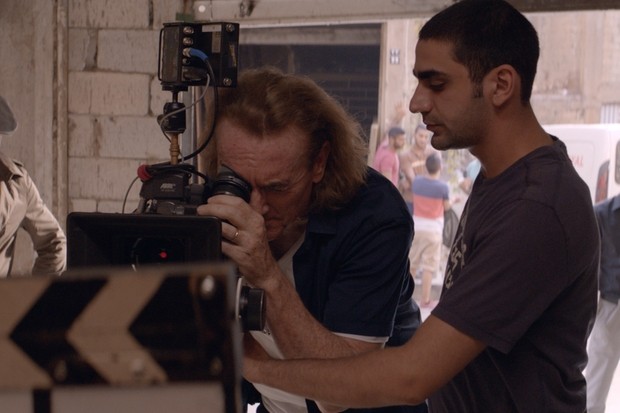Craig Courtice, thenational.ae

Arab filmmakers are embracing a new weapon to express their feelings about war: comedy.
In last year’s Emirati road-trip romp From A to B – which opened the Abu Dhabi Film Festival last November and has been playing at festivals around the world since its regional release at the start of this year – Dubai director Ali F Mostafa played an interrogation scene in Syria for laughs.
At this year’s Toronto International Film Festival, Moroccan auteur Hicham Lasri imagined in his film, Starve Your Dog, the humorous repercussions of a former minister of the interior spilling all his torturous secrets to an angry, conflicted film crew.
And then there is Very Big Shot, which plays at the British Film Institute’s London Film Festival on Sunday October 11. Lebanese director Mir-Jean Bou Chaaya’s first feature film revolves around a Beirut drug dealer who discovers an innovative way to traffic his product: in film cans.
“It’s true, after watching it now, I see many scenes that viewers will find funny,” Bou Chaaya says. “I can imagine them laughing out loud and enjoying the situations in which the characters of the film are found – but I’m not sure that everyone in the world will laugh at the same moments and situations.”
He has a point. The audience at the film’s world premiere in Toronto last month, for example, did not laugh at a scene that took place at the Syrian border, much like the Syrian scenes in From A to B played better with Arabs than westerners.
There is a language barrier, obviously, but more than that these examples highlight a different sensibility about war between the cultures.
“I grew up in the northern suburbs of Beirut, and I witnessed a country that never overcame the consequences of war,” Bou Chaaya says. “We really never intended to make it a comedy. Or a thriller. Or an action movie. We said: ‘Let’s tell a story that we want to tell that translates the concept we want to talk about.’
“All the action that happens in the film is normally action that happen when a country is at war. You have drug dealers, you have assassinations, you have explosions. But the country is not at war. We wanted to keep the violence hidden.”
On the surface, Very Big Shot, which received funding from the Doha Film Institute, is a story about three brothers. The eldest, Ziad (played by Alain Saadeh, who co-wrote the script), wants to get out of the drugs business and open a restaurant for his youngest brother, Jad (Wissam Fares), who served five years in jail for a crime Ziad committed. The middle brother, Joe (Tarek Yaacoub), bakes pizza, the front for their illegal operations. To pull off the one final big deal that will allow them to go legit, they find inspiration in the true story of an Italian film crew who got their illegal goods past airport security by storing them in metal canisters that were marked as containing undeveloped film and therefore couldn’t be X-rayed.
The film-can scheme is a plot device that triggers the funniest scenes, the shooting of the movie within a movie. There will be comparisons with Argo (2012), another film about making a fake movie, or The Producers (2005), a film about putting on a really bad theatre production, but Very Big Shot has a twist – Ziad actually begins to care about the movie and starts to fancy himself as an artist. Then he starts dreaming of something bigger.
“We wanted to talk about the power of the image,” Bou Chaaya says. “We wanted to talk about its effect on our social life and our society and how dangerous it will be when someone from Ziad’s background becomes aware of the power of the image.”



